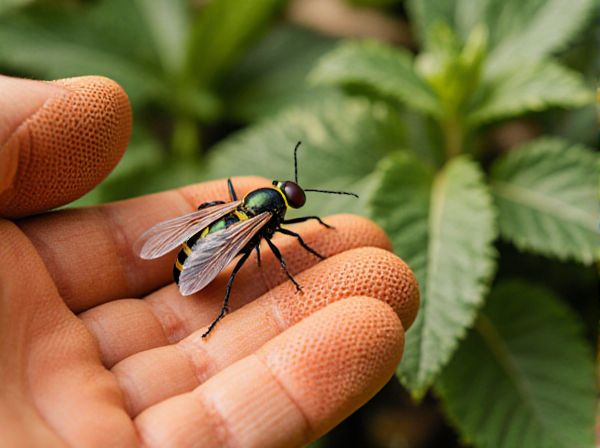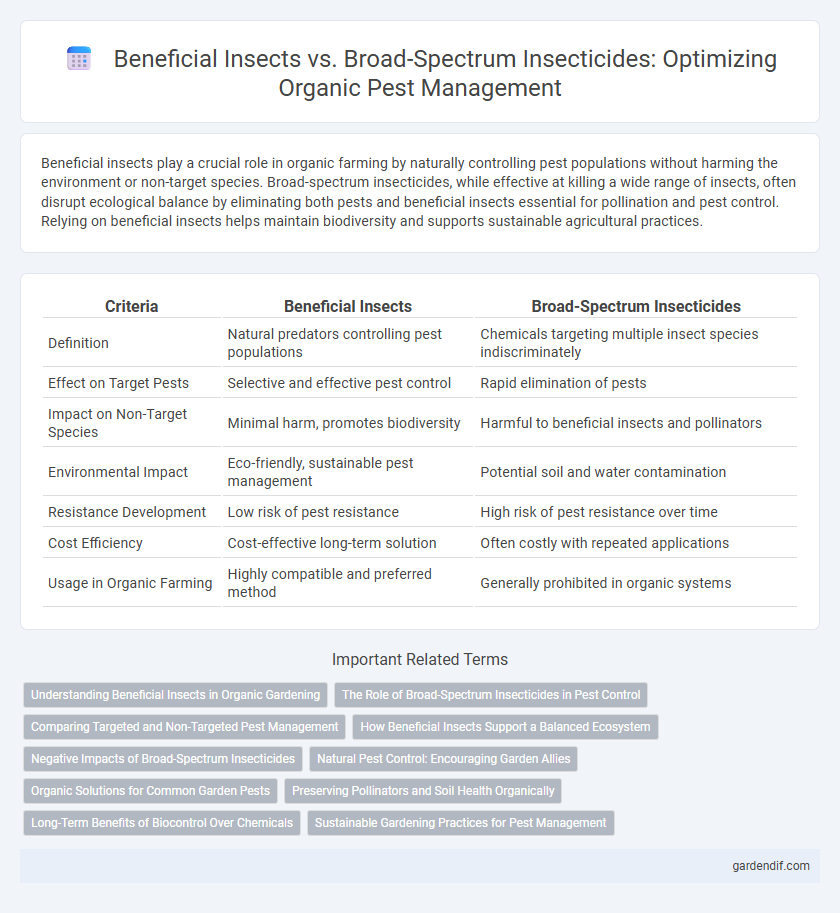
Beneficial insects vs Broad-spectrum insecticides Illustration
Beneficial insects play a crucial role in organic farming by naturally controlling pest populations without harming the environment or non-target species. Broad-spectrum insecticides, while effective at killing a wide range of insects, often disrupt ecological balance by eliminating both pests and beneficial insects essential for pollination and pest control. Relying on beneficial insects helps maintain biodiversity and supports sustainable agricultural practices.
Table of Comparison
| Criteria | Beneficial Insects | Broad-Spectrum Insecticides |
|---|---|---|
| Definition | Natural predators controlling pest populations | Chemicals targeting multiple insect species indiscriminately |
| Effect on Target Pests | Selective and effective pest control | Rapid elimination of pests |
| Impact on Non-Target Species | Minimal harm, promotes biodiversity | Harmful to beneficial insects and pollinators |
| Environmental Impact | Eco-friendly, sustainable pest management | Potential soil and water contamination |
| Resistance Development | Low risk of pest resistance | High risk of pest resistance over time |
| Cost Efficiency | Cost-effective long-term solution | Often costly with repeated applications |
| Usage in Organic Farming | Highly compatible and preferred method | Generally prohibited in organic systems |
Understanding Beneficial Insects in Organic Gardening
Beneficial insects such as ladybugs, lacewings, and parasitic wasps play a crucial role in organic gardening by naturally controlling pest populations without harming plants or beneficial organisms. These insects target specific pests, preserving ecosystem balance and promoting soil health, unlike broad-spectrum insecticides that indiscriminately kill insects and disrupt biodiversity. Understanding the behaviors and habitat needs of beneficial insects enhances pest management strategies, reduces chemical dependence, and supports sustainable organic cultivation.
The Role of Broad-Spectrum Insecticides in Pest Control
Broad-spectrum insecticides play a significant role in pest control by targeting a wide variety of pests simultaneously, providing rapid and effective population suppression. However, their non-selective nature often disrupts natural predator-prey dynamics, leading to the decline of beneficial insect populations such as pollinators and natural pest predators. This disruption can result in pest resurgence and resistance, highlighting the importance of integrating more selective pest management strategies in organic agriculture.
Comparing Targeted and Non-Targeted Pest Management
Beneficial insects such as ladybugs and parasitic wasps provide targeted pest management by specifically attacking harmful pests without disrupting the overall ecosystem. Broad-spectrum insecticides, in contrast, eliminate a wide range of insects indiscriminately, including pollinators and natural predators, which can lead to pest resistance and ecological imbalance. Utilizing beneficial insects enhances sustainable organic farming by preserving biodiversity and reducing chemical inputs.
How Beneficial Insects Support a Balanced Ecosystem
Beneficial insects such as ladybugs, lacewings, and predatory wasps naturally regulate pest populations, reducing the need for chemical interventions. These insects enhance biodiversity by targeting specific pests without harming non-target species, preserving soil health and plant vitality. Relying on beneficial insects promotes a resilient, self-sustaining ecosystem compared to broad-spectrum insecticides that disrupt ecological balance and harm beneficial organisms.
Negative Impacts of Broad-Spectrum Insecticides
Broad-spectrum insecticides cause significant harm to beneficial insects such as pollinators, predatory beetles, and parasitic wasps by indiscriminately killing non-target species essential for natural pest control. The disruption of these insect populations leads to reduced biodiversity and weakened ecosystem services, increasing reliance on chemical inputs. Residual toxicity and bioaccumulation from broad-spectrum insecticides further exacerbate environmental contamination, threatening soil health and water quality.
Natural Pest Control: Encouraging Garden Allies
Beneficial insects such as ladybugs, lacewings, and predatory wasps play a crucial role in natural pest control by targeting harmful pests without damaging plants or beneficial soil organisms. Broad-spectrum insecticides, though effective for pest elimination, often harm these valuable garden allies and disrupt ecological balance, leading to pesticide resistance and secondary pest outbreaks. Encouraging populations of beneficial insects through habitat creation and organic practices enhances sustainable pest management and promotes a healthier, more resilient garden ecosystem.
Organic Solutions for Common Garden Pests
Beneficial insects such as ladybugs, lacewings, and predatory wasps provide targeted pest control by naturally reducing populations of aphids, caterpillars, and whiteflies in organic gardens. Broad-spectrum insecticides often harm these helpful insect populations, disrupting ecological balance and leading to pest resistance. Organic solutions emphasize preserving beneficial insect habitats and using biopesticides derived from natural ingredients to maintain healthy garden ecosystems.
Preserving Pollinators and Soil Health Organically
Beneficial insects such as ladybugs, predatory beetles, and parasitic wasps play a crucial role in organically preserving pollinators and enhancing soil health by targeting pests without harming native bee populations or disrupting microbial communities. Broad-spectrum insecticides, in contrast, indiscriminately eliminate both harmful and beneficial insects, leading to pollinator decline and soil degradation through the loss of nutrient-cycling organisms. Incorporating organic practices that support beneficial insect habitats promotes ecosystem balance and sustains agricultural productivity by maintaining natural pest control and soil vitality.
Long-Term Benefits of Biocontrol Over Chemicals
Beneficial insects such as ladybugs and parasitic wasps offer sustainable pest control by targeting specific pests without harming the ecosystem, promoting long-term agricultural health. Broad-spectrum insecticides often disrupt natural predator-prey balances, leading to pest resistance and the need for repeated chemical applications. Biocontrol enhances soil quality, biodiversity, and crop resilience by preserving essential insect populations and reducing chemical residues in the environment.
Sustainable Gardening Practices for Pest Management
Beneficial insects such as ladybugs, lacewings, and parasitic wasps play a crucial role in sustainable gardening by naturally controlling pest populations without harming the ecosystem. Broad-spectrum insecticides often eliminate both harmful pests and beneficial insects, disrupting ecological balance and leading to pest resistance over time. Integrating beneficial insects into pest management reduces chemical dependence, promotes biodiversity, and supports long-term garden health.
Beneficial insects vs Broad-spectrum insecticides Infographic

 gardendif.com
gardendif.com